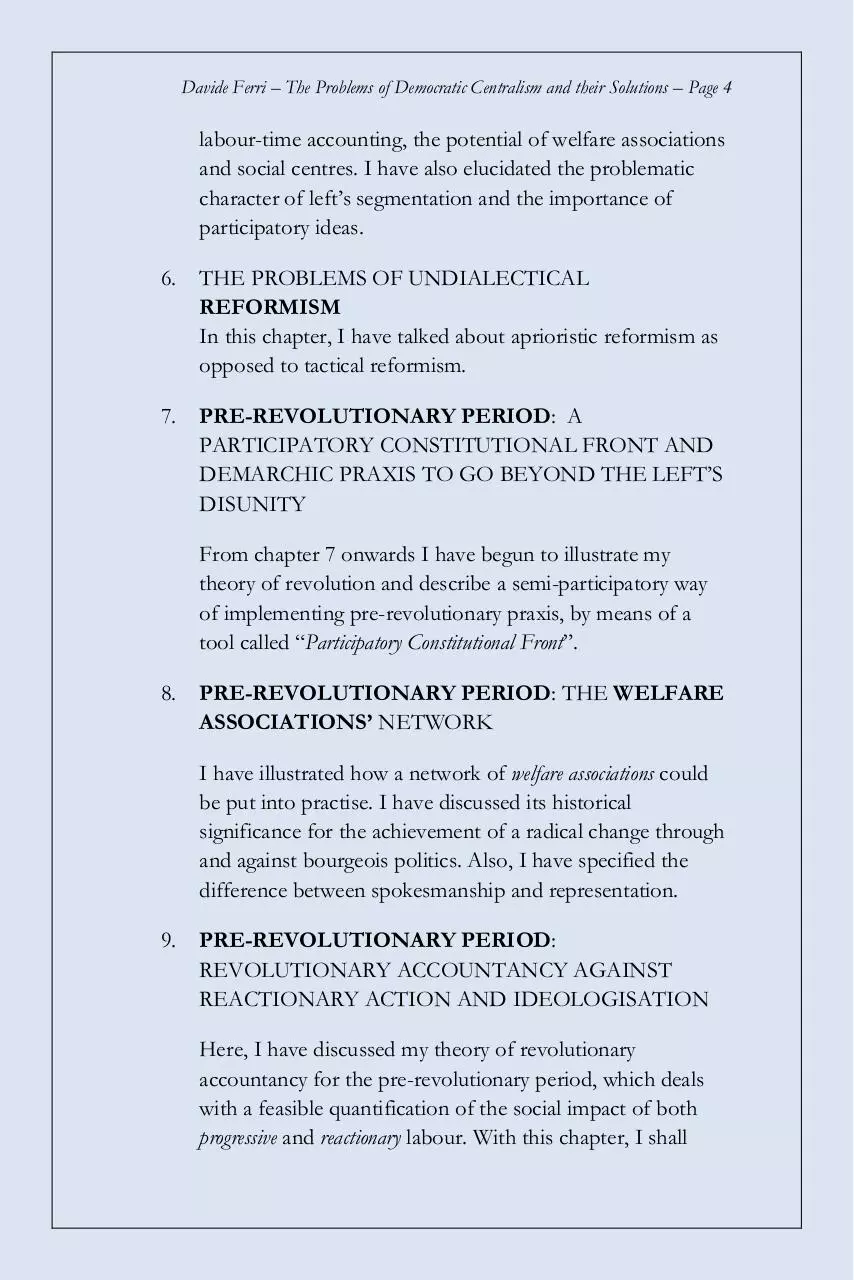Davide Ferri The Problems of Democrati (PDF)
File information
Title: The problems of Democratic Centralism and their Solutions
Author: Davide Ferri
This PDF 1.5 document has been generated by Microsoft® Word 2010, and has been sent on pdf-archive.com on 12/06/2016 at 15:25, from IP address 24.28.x.x.
The current document download page has been viewed 460 times.
File size: 1.6 MB (124 pages).
Privacy: public file





File preview
The problems of Democratic
Centralism and their
Solutions
What to do for the making of a participatory
movement and how to do that
Davide Ferri
Cover photo: 40th anniversary of German Democratic Republic (GDR); Attribution: Bundesarchiv,
Bild 183-1989-1007-402 / Franke, Klaus / CC-BY-SA; Title: Berlin, 40. Jahrestag DDR-Gründung,
Ehrengäste. This photo is licensed under the Creative Commons Attribution-Share Alike 3.0
Germany; License terms at http://creativecommons.org/licenses/by-sa/3.0/de/deed.en
Davide Ferri – The Problems of Democratic Centralism and their Solutions – Page 1
THE PROBLEMS OF DEMOCRATIC CENTRALISM AND
THEIR SOLUTIONS
Written by Davide Ferri
B.A.Economics (Honours)
Shri Ram College of Commerce, Delhi University
On February 10, 2013
Lastly modified on: September 13, 2014
Davide Ferri – The Problems of Democratic Centralism and their Solutions – Page 2
To those who haven’t lost the courage, empathy and happiness in researching for a
better world.
Davide Ferri – The Problems of Democratic Centralism and their Solutions – Page 3
INDEX
1.
INTRODUCTION
Hereby I have discussed my reasons and objectives.
2.
A NON-PARTICIPATORY HISTORY OF
COMMUNIST DISUNITY
Within this chapter I have outlined the impotence of
individualised Communist parties across the world and
mentioned the South Asian scenario.
3.
THE PROBLEMS OF DEMOCRATIC CENTRALISM,
COMMUNIST PARTY POLITICS AND SOVIET
REPRESENTATIVE DEMOCRACY
In this chapter, I have introduced lottery-based democracy.
In order to explain the concept of Democratic Centralism, I
have analysed the Constitution of the Communist Party of
India (Marxist) and its political implications. I have also
mentioned Lenin’s and the Social Democratic support
towards representative democracy. With this chapter, I shall
argue that Democratic Centralism is one of the reasons
behind the Left’s disunity in the XXI century.
4. THE REASONS FOR A PARTICIPATORY PRAXIS.
SOME EXAMPLES OF PARTICIPATORY POLITICS
Here, I have pointed out the limits and merits of a
Participatory Constitutional Front, the pragmatism of a
Welfare Associations’ Network and discussed many features
of Bolivarianism, as well as the historical significance of the
Five-Star movement in Italy.
5.
IDEOLOGICAL CONFUSION IN THE LEFT: THE
IMPORTANCE OF PLANNING
I have mentioned the concept of planning, problem with
money relations in Leninist countries, the advantage of
Davide Ferri – The Problems of Democratic Centralism and their Solutions – Page 4
labour-time accounting, the potential of welfare associations
and social centres. I have also elucidated the problematic
character of left’s segmentation and the importance of
participatory ideas.
6.
THE PROBLEMS OF UNDIALECTICAL
REFORMISM
In this chapter, I have talked about aprioristic reformism as
opposed to tactical reformism.
7.
PRE-REVOLUTIONARY PERIOD: A
PARTICIPATORY CONSTITUTIONAL FRONT AND
DEMARCHIC PRAXIS TO GO BEYOND THE LEFT’S
DISUNITY
From chapter 7 onwards I have begun to illustrate my
theory of revolution and describe a semi-participatory way
of implementing pre-revolutionary praxis, by means of a
tool called “Participatory Constitutional Front”.
8.
PRE-REVOLUTIONARY PERIOD: THE WELFARE
ASSOCIATIONS’ NETWORK
I have illustrated how a network of welfare associations could
be put into practise. I have discussed its historical
significance for the achievement of a radical change through
and against bourgeois politics. Also, I have specified the
difference between spokesmanship and representation.
9.
PRE-REVOLUTIONARY PERIOD:
REVOLUTIONARY ACCOUNTANCY AGAINST
REACTIONARY ACTION AND IDEOLOGISATION
Here, I have discussed my theory of revolutionary
accountancy for the pre-revolutionary period, which deals
with a feasible quantification of the social impact of both
progressive and reactionary labour. With this chapter, I shall
Davide Ferri – The Problems of Democratic Centralism and their Solutions – Page 5
argue that Leftists could organise a revolutionary
accountancy (based on Marx’s Labour Theory Value) that
could greatly contribute to the coming of a radical change
and give a clear revolutionary direction to workers and
activists.
10. POST-REVOLUTIONARY PERIOD: DEMARCHIC
COMMUNISM
Here, I have elucidated general politico-economic
characteristics of Postcapitalism.
11. THE CONCEPT OF HISTORICAL PRODUCTIVITY:
THE PRECONDITIONING FOR A THEORY OF
CONTEMPLATION
In this chapter, I have dealt with philosophy, mass
communication and religion.
I have presented my theory of dialectical morality and
mentioned features of Islam, Hindu Mysticism, Christianity,
the concept of violence etcetera to introduce a theory of
contemplation, which could help the Postcapitalist activists
to get a more appealing praxis with the workers.
12. ART FOR THE BOURGEOIS, ANTI-ART FOR THE
COMMON PEOPLE
Here, having introduced my concept of historical productivity, I
have discussed the concepts of art and anti-art and explained
a way to render art historically productive, providing
examples.
13. CONCLUSIONS
I have provided the readers with a small recap of the book.
14. BIBLIOGRAPHY
Davide Ferri – The Problems of Democratic Centralism and their Solutions – Page 6
Davide Ferri – The Problems of Democratic Centralism and their Solutions – Page 7
INTRODUCTION
“It is foolish under the guise of love and liberty that we should capitalise, rob and
fell the Poor for the Socialistic tree”
(Phil Lynott – Yellow Pearl)
The issues I am going to discuss in this paper range from the general
concept of Participatory Democracy and Demarchy (or Lottocracy), as
implemented by the people in the pre-revolutionary and postrevolutionary period1 to a theory for a dialectically moral interpretation of
Art and the problems of Democratic Centralism, which is still regarded
as the most viable political system by most communist vanguards.
With this paper, I will try to provide a practical solution to the
imbroglio of Representative Democracy – as objectified, in Socialism, by
Democratic Centralism – through two spokesmanship-based political
projects, namely, that of the Participatory Constitutional Front and that of
Networkism. The latter is based on the Welfare Associations’ Network,
which is to be dialectically helped by a Participatory Movement.
At the end of this work, I will expose a theory of dialectical morality,
which can be useful in terms of praxis and cultural analysis.
Needless to say, considering the complexity of the issues that I am
going to discuss hereby and the great value I give to the reviews on
the part of insightful Leftists, the paper will be updated with new
editions from time to time, which will try to improve my work and
rectify potential inaccuracies.
Of course, I hope to get new or comparatively better ideas from all
the disunited workers and leftists of the world, whose unity is,
sincerely speaking, quite dear to me and to the Postcapitalist cause.
Throughout India only, as of 2005, there were more than 100
Communist parties, not to mention the various collectives, revolutionary
groups associated or non-associated with these parties spread across
1
The term “Pre-Revolutionary” alludes to that period before the all-scale Socialisation
and Democratisation of the means of production and distribution.
Davide Ferri – The Problems of Democratic Centralism and their Solutions – Page 8
the country2.
Some of these Leftist parties are, of course, not very active, some are
only theoretically active, whereas some exist only to count (their bunch
of members, to then start counting from the beginning again!).
What all historically productive3 lies in such disunity and confusion–
to mention only this Asian scenario – is scientifically unknown.
Karl Marx and Friedrich Engels, about one century and a half ago,
wrote:
The Communists do not form a separate party opposed to the other
working-class parties. They have no interests separate and apart from those of
the proletariat as a whole. They do not set up any sectarian principles of their
own, by which to shape and mould the proletarian movement. [Karl Marx
and Friedrich Engels – The Communist Manifesto – emphasis added]
Needless to say, throughout the XX century and the early XXI
century, Communists did build up, almost everywhere, separate radical
parties in opposition to each other, while making sporadic alliances
and fronts.
Why this sectarianism?
There were various seemingly logical reasons for this, such as the rise
of internal reformist tendencies, philological discussions, debates on
which stratum of the proletariat (and not only) is to be considered as a
productive political base, types of propaganda to be undertaken,
nationalistic tactics, arguments on how much reformism is needed
before undertaking the revolutionary path and so on and so forth.
Whether such inter-communist divergences make historical sense or
not will not be analysed extensively here.
However, the following chapters might give certain political
indications answerable to many political issues that have been raised
above, and, at the same time, might suggest a praxis that can ward off
2
3
Broadleft’s interesting report is available online. http://www.broadleft.org/in.htm
I shall accurately define this term later
Download Davide Ferri - The Problems of Democrati
Davide_Ferri_-_The_Problems_of_Democrati.pdf (PDF, 1.6 MB)
Download PDF
Share this file on social networks
Link to this page
Permanent link
Use the permanent link to the download page to share your document on Facebook, Twitter, LinkedIn, or directly with a contact by e-Mail, Messenger, Whatsapp, Line..
Short link
Use the short link to share your document on Twitter or by text message (SMS)
HTML Code
Copy the following HTML code to share your document on a Website or Blog
QR Code to this page

This file has been shared publicly by a user of PDF Archive.
Document ID: 0000385173.